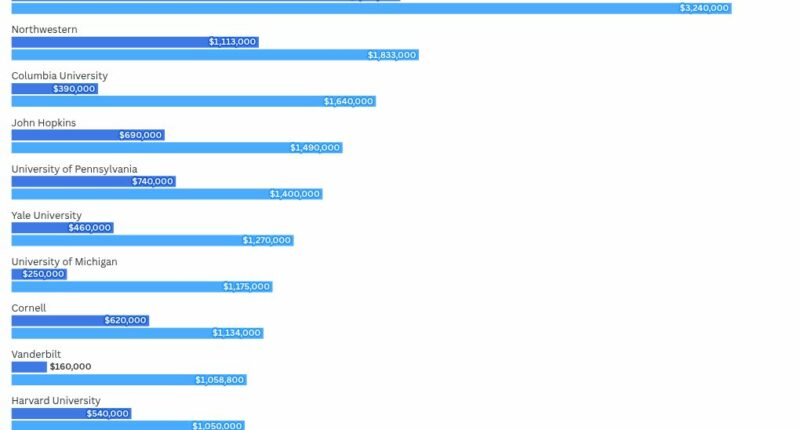Share this @internewscast.com
This year, the nation’s leading universities have significantly increased their lobbying expenditures as they respond to President Trump’s intensified scrutiny of higher education, according to recent federal disclosures.
In total, 24 elite universities and one of the largest college systems in the U.S. have collectively invested approximately $24 million in lobbying efforts in Washington, D.C. This figure is more than double the amount spent during the same period last year, highlighting a substantial increase in advocacy spending.
“Universities are stepping up their lobbying activities to exert influence, either by directly engaging with the White House or by lobbying key members of Congress who are believed to have sway over the administration,” explained Thomas Holyoke, a political science professor at California State University, Fresno, who has over two decades of experience studying lobbying dynamics.
Among these institutions, at least 11 universities and the University of California (UC) system have each allocated over $1 million to lobbying efforts within the first nine months of the year. The UC system, encompassing renowned campuses like UC Berkeley and UC Los Angeles, alone accounted for more than $3.2 million in lobbying expenses.
Close behind, Northwestern University, Columbia University, and Johns Hopkins University have collectively spent upwards of $4.9 million. Harvard University, which has taken legal action against the federal government, has already channeled $1 million into lobbying activities this year.
Meanwhile, Yale University, facing its own pressures, has expended over $1.2 million. The University of Pennsylvania has directed $1.4 million toward lobbying, with Cornell University and the University of Michigan-Ann Arbor both contributing $1.1 million to their advocacy efforts.
Experts predict colleges will spend even more before the year’s end as the Trump administration continues to shake up higher education. This month, the Department of Education and White House officials asked schools to sign on to a 10-point federal funding compact that sparked concerns from university administrators. As of now, at least seven universities declined to sign it.
Universities lobbied on issues ranging from campus safety to federal funding to visas for international students in the first nine months of the year, as the federal government yanked allocated funds and initiated investigations into antisemitism on multiple campuses.
“The focus of our advocacy efforts, including direct lobbying, centers on issues that are important to students, faculty and staff on our campus, whether that’s federal funding for scientific research, student financial aid, immigration policy, college athletics or other matters,” said Brian Clark, vice president for news and strategic campus communications at Brown University.
He added that both public and private universities, alongside other industries, had seen a rise in lobbying activity this year, especially before the passage of the “big, beautiful bill’ — a tax and spending package that included wide-ranging funding cuts and changes affecting higher education.
In their efforts to exert influence in Washington, universities have increasingly leaned on lobbying groups, spending up to eight times as much to retain influential firms than the year before.
At least 15 universities hired new lobbying firms after Trump won the election in November. The Massachusetts Institute of Technology, Duke University, Brown and Yale registered to lobby through firms this year after exclusively using in-house lobbyists all of 2024.
Vanderbilt University, after years of in-house lobbying, hired three new firms after Trump returned to office. Georgetown University also retained three lobbying firms.
Firms hired included BGR Governmental Affairs, Ballard, S-3 Group and Miller Strategies — all of which have strong ties to the Trump administration or GOP lawmakers — and leading firms such as Brownstein Hyatt Farber Schreck and Akin Gump Strauss Hauer & Feld.
BGR Governmental Affairs and Ballard’s alumni include two members of Trump’s Cabinet: Transportation Secretary Sean Duffy and Attorney General Pam Bondi. According to Politico, these firms have seen major boosts to their bottom lines during Trump 2.0.
“Lobbying has become intensely personal, to where they’re trying to find someone who has the ear of the president,” said Robert Kelchen, head of the Department of Educational Leadership and Policy Studies at the University of Tennessee.
“Not just working through Congress — as has often been the case — but going through the president, as power in Washington has really flown away from Congress and toward the White House.”
Kelchen said it isn’t uncommon for universities to invest in in-house and firm lobbying.
“I think the question is, under the second Trump administration, which one of these strategies works better?” He said. “And I don’t think there’s a clear answer to that yet.”
Even universities not directly in Trump’s line of fire quietly began investing more in lobbying to counter the administration’s far-ranging actions toward higher education. Rice University has spent $510,000 lobbying the federal government in 2025 and after years of outsourcing, the University of Notre Dame began pouring money into in-house lobbying.
“The Trump administration has created, very intentionally, a climate of fear throughout the country, and it’s leaving colleges and universities wondering who will be next in the crosshairs,” said Mia McIver, the executive director of the American Association of University Professors.
But she called universities’ lobbying efforts misguided.
“It represents an effort to curry favor with an administration that is no friend to college students, no friend to college teachers,” she said.
While spending by universities increased across the board in the first half of the year, some universities scaled back their spending in the third quarter.
Brown, Cornell and Northwestern cut back their spending by tens of thousands of dollars this past quarter, with Brown and Northwestern’s spending falling by more than $100,000. Brown signed a deal with the Trump administration, restoring $500 million in funding. Cornell and Northwestern have yet to negotiate a deal since the administration froze more than $1.8 billion at both schools earlier this year.
Jodie Ferise, a former lobbyist and college administrator, described Trump’s budget bill as a flash point for colleges, with many private universities pouring money into trying to influence the bill’s provisions.
“The ‘big, beautiful bill’ caused tremendous anxiety in the industry as it went through its various iterations,” Ferise said. “There was widespread concern that it was not being directed at a particular institution, we felt it was being targeted much more widespread across the industry.”
The bill, which Trump signed into law July 4, had several consequential changes for colleges and universities buried in it. It included provisions that allow the federal government to raise universities’ endowment tax rate to up to 8 percent. It also placed limits on federal student loans for graduate schools, potentially hurting the bottom lines of college graduate programs.
Following the bill’s passage, Ferise said, universities may have had less of a reason to lobby the administration. During the past couple of months, universities’ individual relationships with the Trump administration have also changed, with some capitulating or fighting it.
Columbia and Harvard, which have faced heavy scrutiny from the Trump administration, maintained high levels of spending in the third quarter, though Harvard’s decreased slightly. Columbia — which has already spent more than twice as much lobbying this year than it did previously — made a deal with the administration to pay a $221 million settlement over three years, to restore $400 million in yanked federal funds.
Meanwhile, Harvard has mounted legal challenges against the federal government for revoking its federal funding and threatening its ability to enroll international students.
Ferise said universities will likely continue to spend big on lobbying given the uncertainty they’re facing under Trump.
She referenced the Trump administration’s 10-point compact, which requested schools publicize graduate data, reform how race and ethnicity are used in admissions, eliminate tuition for science undergraduates at certain universities and more.
Though White House senior adviser May Mailman said schools would still be eligible for grants if they don’t sign the compact, she said universities wouldn’t get funding preference or possible White House event invitations.
“[Universities] don’t have to be wound quite as taut as they have been over the first half of the year because they’re just simply becoming more accustomed to the lay of the land,” Ferise said. But, she added, “these schools have to stay on the job. They have to stay vigilant, they have to stay active.”










